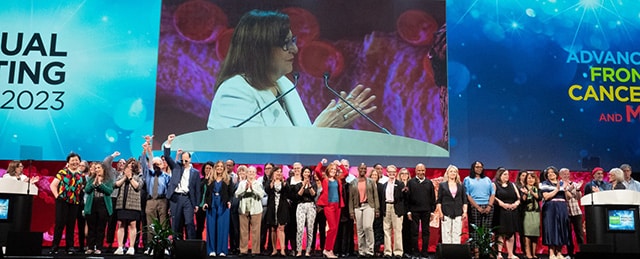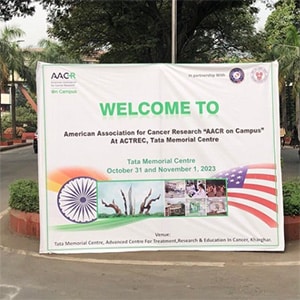Each case of cancer is unique, in part because each individual impacted by cancer has their own unique story. As today is World Cancer Day 2025, the Union for International Cancer Control (UICC) is asking how we can come together to rewrite the future of cancer care by looking at the ways we are “United by Unique.”
Incorporating the unique perspectives of patients into cancer research has been a long-standing mission of the American Association for Cancer Research (AACR). The AACR’s efforts include patient advocacy programs that help ensure the patient voice is heard as early in the research process as possible; AACR Cancer Progress Reports that feature profiles of patients who are a testament to the power of medical research; the Cancer Today magazine that aims to educate and empower patients, survivors, and caregivers; and meetings, forums, programs, workshops, and more that bring people together from around the world to learn about the latest advances in cancer research, including what it could mean from a patient perspective.
“We are very proud to recognize and support World Cancer Day alongside UICC and many other organizations around the world,” said AACR CEO Margaret Foti, PhD, MD (hc). “Everything we do is in pursuit of better outcomes for patients. There is no effective ‘one-size-fits-all’ approach to cancer treatment. Recognizing the needs of the individual and integrating the expertise of the patient community into cancer research are central to the success of the entire cancer research enterprise.”
Here are just a few examples of specific programs from the AACR that aim to help unite patients, researchers, and everyone impacted by cancer through their unique journeys.
AACR Scientist↔Survivor Program®
Established in 1998, the AACR Scientist↔Survivor Program® (SSP) helps to foster mutually beneficial and enduring partnerships between cancer survivors, patient advocates, and scientific researchers. Each year at the AACR Annual Meeting, patient advocates who are selected for the five-day program through an application process attend sessions to help them better understand some of the key topics being addressed at the meeting and have an opportunity to interact with researchers, health care professionals, and other advocates. So far, more than 1,200 patient advocates have graduated from the program from 29 countries, including Nigeria, Japan, India, and the United Kingdom.
Those graduates have gone on to become advocate mentors at future meetings, serve as speakers at other AACR conferences, participate in the Rally for Medical Research on Capitol Hill, share what they learned with others, and more. One graduate, Yoshiyuki Majima, PhD, MPH, even started a scientist-survivor program in Japan in 2015 that is modeled off what he learned at AACR SSP. It has become an annual event attended by Foti each year. The AACR recognized Majima in 2020 with a Distinguished Public Service Award for his advocacy work, including the 2006 formation of the Pancreatic Cancer Action Network (PanCAN) Japan affiliate in memory of his sister who died of pancreatic cancer.
Additionally, the AACR established a partnership with the Canadian Institutes of Health Research in which the organizations cosponsor patient advocates from Canada to attend SSP at the AACR Annual Meetings. This initiative, which is going into its third year, has helped to substantially increase the number of applications from Canada.

AACR Patient Advocate Forums
The AACR holds virtual Patient Advocate Forums that are free and open to the public to help provide education on topics relevant to cancer patients. Most recently, the AACR Patient Advocate Forum: A New Generation of Patient-Centric Clinical Trials on January 21 offered a discussion on how clinical trials are becoming more efficient and inclusive for patients.
Past patient forums have focused on the use of artificial intelligence in cancer research, new approaches for drug discovery and development, the evolution of FDA regulatory science and its impact on cancer, and the impact of advanced technologies on cancer research.
In total, the AACR has held more than 40 Patient Advocate Forums, with each typically having attendees from at least 20 different countries.
Beyond these forums and the AACR Annual Meeting, patient advocates are also invited to serve on planning committees for other AACR conferences; deliver the advocate keynote at the AACR Conference on The Science of Cancer Health Disparities in Racial/Ethnic Minorities and the Medically Underserved; and participate on panels, present posters, and more.
AACR on Campus
AACR on Campus (AACRoC) is a cooperative overseas outreach program that offers educational opportunities for young researchers in low-resource settings. The program is often designed to feature perspectives from those in the local community as well as researchers from around the world who can share insights on career development, trends in cancer research and innovation, and tips on science communication and publication. Past events have been held in Latin America (virtual), India, and Brazil, with plans in 2025/2026 for AACRoC programs in Malaysia (in partnership with Cancer Research Malaysia) and Taiwan (in partnership with National Health Research Institutes).

In evidence of the program’s global development, reach, and reputation, the AACR Global Affairs Committee will soon be conducting competitive reviews of AACRoC applications from countries in Africa, South America, Eastern Europe, and the Arabian Gulf.
AACRoC creates opportunities to incorporate patient advocacy into the program with patients from the host country and other parts of the world sharing their unique perspectives. AACRoC will be expanding upon this to include patient advocacy as one of its targeted event themes, which is just the latest example of how the AACR is dedicated to ensuring the patient voice is an integral part of cancer research around the world.
#UnitedByUnique is not just a theme for this World Cancer Day, it is how the AACR has and will continue to operate as it works to fulfill its ultimate mission to prevent and cure cancer through research, education, collaboration, and communication.


